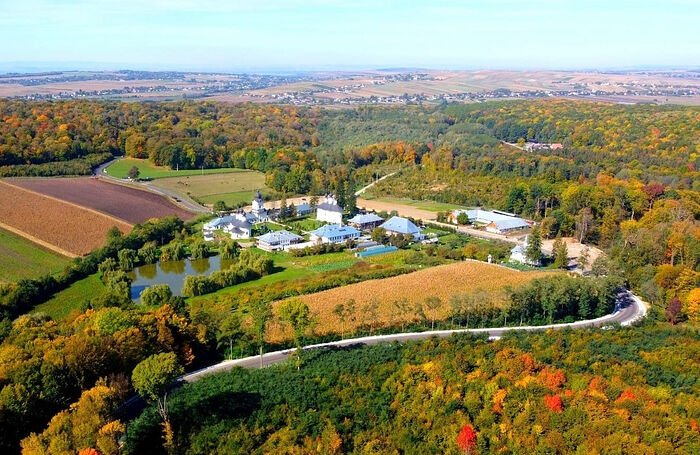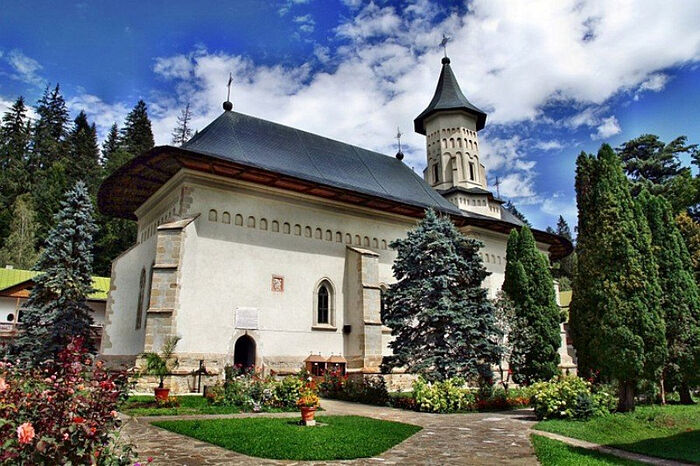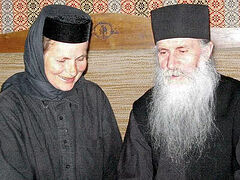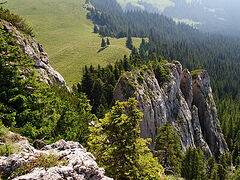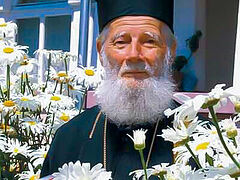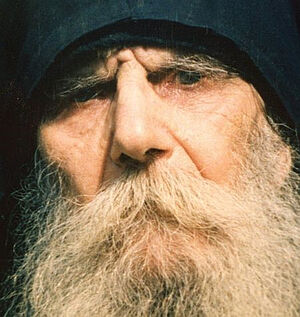 Hieroschemamonk Paisie (Olaru) The great Romanian elders had their own confessor—a Confessor with a capital “C”—a schemamonk named Paisie. “I couldn’t wait to get out of prison so I could go see Fr. Paisie (Olaru),” says Elder Justin (Pârvu). “My heart burned in my chest with the desire to see him, and after I was released, I went straight to Fr. Paisie’s cell and waited for two days at his door for him to receive me to Confession.” All the Romanian faithful loved and still love him, no less than Archimandrite Justin. Elder Paisie was a man of grandiose spiritual greatness, possessed of great gifts of grace; and in 2025, he will be numbered among the saints.
Hieroschemamonk Paisie (Olaru) The great Romanian elders had their own confessor—a Confessor with a capital “C”—a schemamonk named Paisie. “I couldn’t wait to get out of prison so I could go see Fr. Paisie (Olaru),” says Elder Justin (Pârvu). “My heart burned in my chest with the desire to see him, and after I was released, I went straight to Fr. Paisie’s cell and waited for two days at his door for him to receive me to Confession.” All the Romanian faithful loved and still love him, no less than Archimandrite Justin. Elder Paisie was a man of grandiose spiritual greatness, possessed of great gifts of grace; and in 2025, he will be numbered among the saints.
Fr. Paisie was born on June 20, 1897, in the village of Stroești, Lunca Commune, Botoșani County, in a poor family that already had five children. His parents, Ioan and Ecaterina, raised them in deep faith and love for God. His father was a forester and his mother looked after the house and the children. After graduation, Fr. Paisie joined the army and fought in World War I.
When he returned from the front, the young Peter, chosen by God for the monastic life from an early age, left his father’s house in 1921 and entered the Cozancea Skete—the closest to his native village. On June 9, 1922, he was tonsured in monasticism with the name Paisie. After several years of obedience in the church and the brotherhood, filled with zeal for God and longing for solitary prayer from a young age, he retired into silence in the woods not far from Cozancea, where he built himself a small cell with a chapel.
During the day he would carry out obedience in the skete, and at night he would labor in prayer, fasting, and vigil. However, his life in Christ remained hidden and none of his disciples knew his tears and labors. Fr. Paisie began to have his own disciples when he was still young; the closest of them were the very young Constantin Ilie, later the famous Archimandrite Cleopa, and two of his brothers. In this skete, in silence and prayer, obedience and strict participation in Church services, Fr. Paisie went through the higher school of spirituality, humility and patience, purification from the passions, and renewal of the spirit.
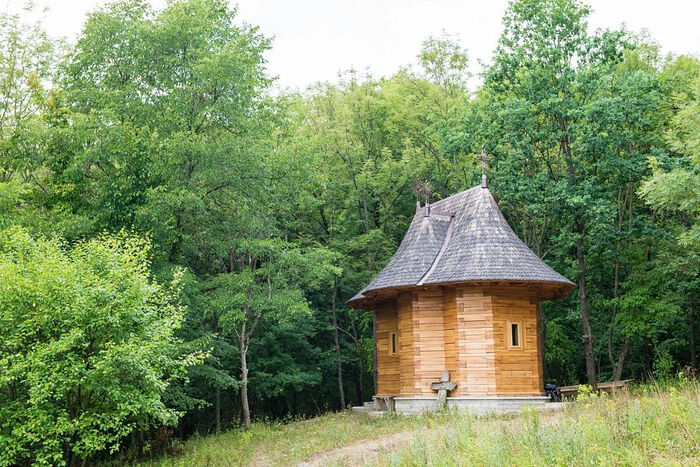 Cozancea Monastery, chapel on the site where Elder Paisie labored as a hermit
Cozancea Monastery, chapel on the site where Elder Paisie labored as a hermit
His most characteristic virtue was love for God and neighbor. He saw God in everything. He had boundless love for flowers, children, birds, sick people, and the whole creation of God in general. Therefore, he was charged with the obedience of caring for the sick members of the skete for many years.
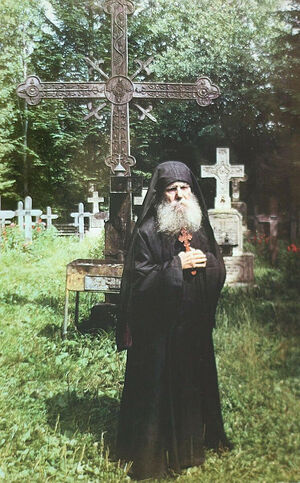 Elder Paisie (Olaru) In 1943, Fr. Paisie was ordained a hierodeacon. On April 4, 1947, he was ordained a hieromonk and named abbot and spiritual father of Cozancea Skete, which had twenty-five inhabitants at the time. However, seeing that the abbatial obedience deprived him of silence, he transferred to the brotherhood of Sihăstria Monastery, headed by his disciple Archimandrite Cleopa (Ilie), where more than seventy monastics labored in asceticism. For more than forty years, Fr. Paisie was the confessor of the brethren there and for many pilgrims who flocked to him from everywhere, and he became one of the most famous elders in Romania.
Elder Paisie (Olaru) In 1943, Fr. Paisie was ordained a hierodeacon. On April 4, 1947, he was ordained a hieromonk and named abbot and spiritual father of Cozancea Skete, which had twenty-five inhabitants at the time. However, seeing that the abbatial obedience deprived him of silence, he transferred to the brotherhood of Sihăstria Monastery, headed by his disciple Archimandrite Cleopa (Ilie), where more than seventy monastics labored in asceticism. For more than forty years, Fr. Paisie was the confessor of the brethren there and for many pilgrims who flocked to him from everywhere, and he became one of the most famous elders in Romania.
In 1949, Archimandrite Cleopa, whose fame had already spread throughout the entire country, was sent to Slatina Monastery to improve the monastic life there. He took more than twenty experienced Sihăstria monks with him, including, of course, the main spiritual father of his entire life, Elder Paisie. This spiritual mission was of great importance, marking the beginning of a whole stream of spiritual renewal in Moldovan monasticism.
Later returning to Sihăstria, Fr. Paisie continued to carry his holy obedience as a confessor, receiving monks and laymen, and managed to educate hundreds of monks and thousands of faithful laymen, self-sacrificing priests, wonderful young people, and educated intellectuals of all ages.
Fr. Paisie was a grace-filled confessor. He was God’s chosen, endowed by Him with exceptional gifts for fulfilling the important mission of cultivating people for the Kingdom of Heaven. He was a bearer of love, joy, and blessing. He received everyone at any time of the day or night, and never spoke about hell, the punishment awaiting sinners, or the strictness of the canons. He greeted everyone meekly and joyfully and blessed them. He listened to confessions with great patience, giving everyone hope for salvation, prescribing penances according to strength, and would give them a small gift and forgive their sins, entreating the penitent to give up the sins he had committed. Finally, he wished everyone to gain “a corner of Paradise,” or he would say: “We’ll see each other at the gates of Paradise!”
Many times I saw how he wept for his spiritual children: the ill, those in danger, much-suffering mothers and children, and those who have fallen into strong temptations and sins. I’ve never seen any monks or spiritual fathers who would love people more than he did, who would have enough patience to deal with everyone, who would sacrifice their time, rest, prayer, sleep, health, and even salvation, who would take such great responsibility before our Savior Jesus Christ for thousands of human souls with but one desire—that everyone might be saved.
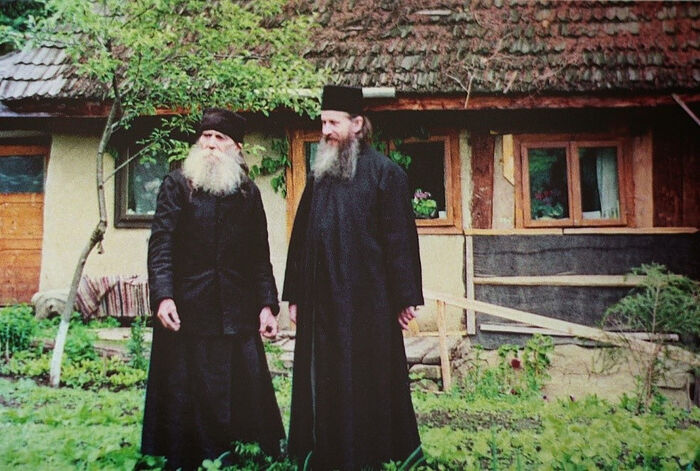 Elder Paisie with his spiritual child Archimandrite Ioanichie (Balan) in front of his cell at Sihla Skete
Elder Paisie with his spiritual child Archimandrite Ioanichie (Balan) in front of his cell at Sihla Skete
He blessed monks with one hand and laymen with the other, and made no distinction between them. Under his stole, we were all brothers; especially since he had not a few lay spiritual children who surpassed priests and monks with their labors, humility, tears and fasting, patience, and alms. This is why everyone sought him out and loved him: Under his stole, everyone changed their lives for the better and reconciled with Christ.
As for his spiritual feat, none of his disciples knew its full extent. Fr. Paisie carried out his monastic labors in secret. As gentle and forgiving as he was with others, so strict was he with himself. He slept very little, and then on a bench, leaning against something; he ate once a day, in the evening, after Confession was over and he was left alone; he had noetic prayer; he prayed and fulfilled his evening rule in secret from everyone, and had the gift of tears.
He confessed weekly to his confessor, Archimandrite Cleopa, and also communed every week, on Saturday, when he usually served the Divine Liturgy. He undoubtedly possessed the gift of clairvoyance, as testified to by faithful laity and monks. He foretold future events, revealed innermost thoughts and deeds that disciples were ashamed to admit, and spoke about many hitherto unknown facts.
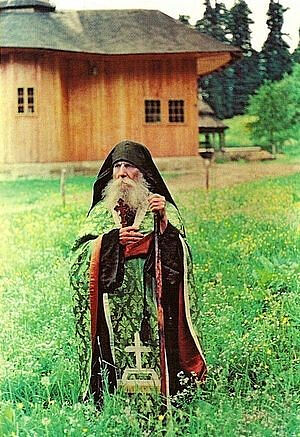 Elder Paisie at the Church of the Nativity of St. John the Forerunner at Sihla Skete Fr. Paisie’s most fruitful years as a confessor, 1970-1985, were spent at the Sihla Skete of Sihăstria Monastery. Then he got sick and had to return to Sihăstria. In 1986, he broke his leg and spent the rest of his life in bed. In 1988, he went partially blind and deaf, but his memory, patience, and joy of the Holy Spirit, as well as his closest disciples never left him until the very last minute of his departure to the Lord.
Elder Paisie at the Church of the Nativity of St. John the Forerunner at Sihla Skete Fr. Paisie’s most fruitful years as a confessor, 1970-1985, were spent at the Sihla Skete of Sihăstria Monastery. Then he got sick and had to return to Sihăstria. In 1986, he broke his leg and spent the rest of his life in bed. In 1988, he went partially blind and deaf, but his memory, patience, and joy of the Holy Spirit, as well as his closest disciples never left him until the very last minute of his departure to the Lord.
On his sick bed, Fr. Paisie prayed with the unceasing prayer of the heart, confessed his close spiritual children, and gave invaluable advice, partially published in Spiritual Conversations.1 Sometimes he would say through tears:
“A spiritual father bears great responsibility! I think I’m suffering now because of my own sins and because I absolved sins and allowed people to have Holy Communion too easily!”
This is how the great hesychast and spiritual father of numerous spiritual children, our Fr. Paisie the Confessor labored in asceticism and spent his life on Earth. Few monks and confessors are able to successfully combine the labors of a hermit with ministry as a spiritual father, solitude with an abundance of spiritual children, love for God with love for neighbor, hidden tears with pain of heart for disciples.
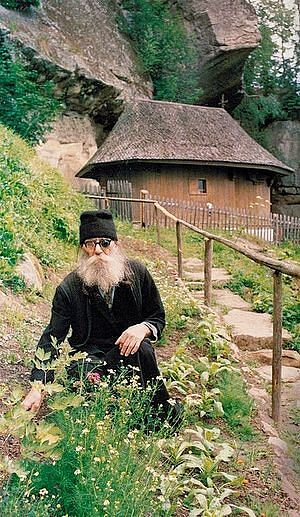 Elder Paisie in the ancient Transfiguration Church at Sihla Skete At his cell, you felt happy and peaceful, you found hope for salvation, you began to feel a thirst for life, and everything became wonderful, because he himself so loved the creation of God, from the starry sky to the flowers and birds in the mountains, from angels and monks to mothers with children.
Elder Paisie in the ancient Transfiguration Church at Sihla Skete At his cell, you felt happy and peaceful, you found hope for salvation, you began to feel a thirst for life, and everything became wonderful, because he himself so loved the creation of God, from the starry sky to the flowers and birds in the mountains, from angels and monks to mothers with children.
On the night of October 18, 1990, at four in the morning, the venerable 93-year-old confessor Hieroschemamonk Paisie (Olaru), surrounded by his closest disciples, gave his soul into the hands of Christ.
Fr. Paisie’s funeral service, on Saturday, October 20, was served by a great synaxis of abbots, spiritual fathers, and lay priests, headed by His Eminence Metropolitan Daniil of Moldova and Bukovina, now the Patriarch, and His Grace Bishop Ioachim of Vaslui, vicar of Roman and Huși. Hundreds of monks and nuns and more than a thousand laymen, spiritual children of Fr. Paisie, flocked to the funeral. Everyone saw Elder Paisie off with lit candles in their hands, tears in their eyes, and a majestic farewell chant on their lips:
“With the saints give rest, O Christ, to the soul of Thy departed servant Hieroschemamonk Paisie, where sickness and sorrow are no more, neither sighing, but life everlasting.”
In his monastic labors, Hieroschemamonk Paisie (Olaru) was a hesychast, who had a hard time giving up silence, his secluded skete life, and his simple wooden cell in the bosom of nature, on the edge of the forest. Living in large monasteries with many monks, a common daily routine, noise, and various cares was a burden to him.
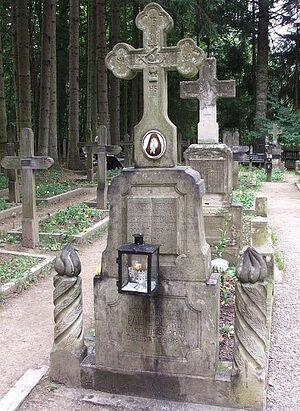 Grave of Elder Paisie at the Sihăstria Monastery cemetery Fr. Paisie was a spiritual confessor. He appealed to the heart rather than to the mind. He humbled himself and even wept for his spiritual children, that they might also be humbled and weep for their sins.
Grave of Elder Paisie at the Sihăstria Monastery cemetery Fr. Paisie was a spiritual confessor. He appealed to the heart rather than to the mind. He humbled himself and even wept for his spiritual children, that they might also be humbled and weep for their sins.
In a few words, Fr. Paisie managed to encourage everyone who knocked on his door, bring them out of hopeless despair, and implant in everyone the hope of receiving forgiveness in Paradise. Out of his great love and pity for everyone, the Elder never once scolded anyone, never sternly rebuked, never raised his voice, but applied balm to people’s open spiritual wounds with great skill.
Fr. Paisie was an invaluable confessor of our times. He managed to win more souls for Christ than others, because he tried harder and worked deeper with the human soul, and loved more.
From Părintele Paisie Olaru, povăţuitor spre poarta Raiului. Iaşi: Doxologia, 2010. Pp. 106–110. (Fr. Paisie (Olaru), Guide to the Gates of Paradise)

